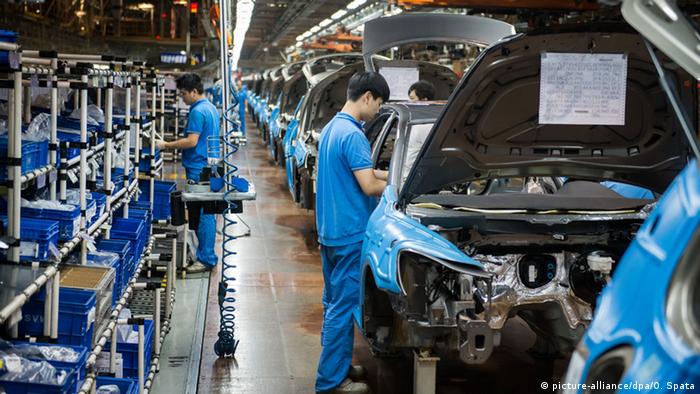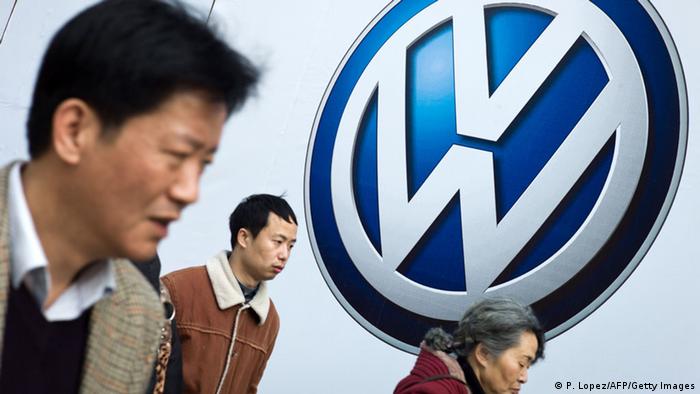Despite the harsh criticism threatening Volkswagen in Europe and
America, DW columnist Zhang Danhong, in an open letter to VW, expresses
confidence that Chinese car buyers will stay loyal to the brand.
Dear Volkswagen Group,
I know you're having a tough time right now. At the moment,
you're the bad guys, the target of concentrated media attention of the least
desirable kind: You're the scandal of the day. Journalists are working overtime
on articles, op-eds and analyses, covering the full gamut of speculation about
what the implications of your diesel emissions scam might prove to be.
And there's plenty to speculate about. Even the company's
possible bankruptcy has been mooted! Two things could lead to your demise: Car
buyers could boycott your brand, or class-action lawsuits in the USA could wipe
out your balance sheet. As a side effect, the cherished reputational capital of
"Made in Germany," built up over generations, could be dragged into
the abyss along with VW's brand. I can well understand the doom-and-despair
mood in Wolfsburg at the moment.
But: Chin up, VW! You won't go over a cliff. Your salvation has
a name: China. First, because the Chinese market - your most important market -
is hardly affected by the diesel emissions scam. Second, because as a German
company, you've been profiting for years from the grand mythos of Germany that
prevails in China, and you'll continue to do so.
I've explored in a previous column the reasons why Germany is economically successful - and why many Chinese idealise Germany as a nearly
corruption-free political-economic nirvana. Scandals like the interminable
delays and screwups associated with the construction of BER, the new Berlin
airport, haven't tarnished Chinese faith in German virtues. On the contrary:
Some Chinese actually see the controversy around such phenomena as a sign of
the strict supervision and sense of responsibility of the country's supervisory
boards.

This time around, you'll be able to count on the Chinese once
again. The auto industry expert Zhong Shi, who is very well known in China -
he's Ferdinand Dudenhöffer's Chinese equivalent - indirectly expressed his
empathy for your emissions scam. As he sees it, VW overtook Toyota as the
world's biggest-selling automotive group in the first half of this year, a
corporate goal it achieved three years ahead of VW's target date for that
marvellous milestone. To keep its nose ahead, VW, according to Zhong, had to drastically
increase sales of diesel automobiles in North America. This explained, in his
view, why the Germans sought to achieve a sales breakthrough with a bit of
trickery. The means justified the ends: The fact that VW absolutely wanted to
become Number One in the world - and stay Number One - impresses the Chinese
hugely. After all, anything else would be second-class - and Germans don't do
second-class.
It's the Americans' fault
Zhong also came close to suggesting the strict emissions
standards in the USA were co-responsible for your disaster. He said: "Even
though VW has advanced emissions control technology, it's nevertheless
difficult to meet California's clean-air standards. That's why VW came up with
the idea of using software to manipulate emissions test results."
Others were more direct. "If the Germans can't meet the
standards, then the standards are simply unrealistic," wrote a Chinese
commenter.
For many Chinese, Americans are the incarnation of evil. In the
same way they've been trying to trip up China on its way to world leadership,
they've also been using underhanded methods to undermine their competition.
"Last year they weakened Toyota; this year it's VW's turn," wrote a
commenter on Weibo, China's version of Twitter, referring to a 2014 controversy
in the US alleging sticky throttles on Toyotas.
DW columnist Zhang Danhong was born in Beijing and has lived in
Germany for more than 20 years.
Once VW has been cast in the victim's role, all restraints on
the sympathy of the Chinese for Volkswagen are unbound. An editorialist from
the respected Caixin Group, a financial and business media service, rejected
the use of the term "swindlers" in reference to VW, used the word
"cheating" in reference to your scam only in quotation marks, and
went on to say that if you did indeed "cheat", then surely it will
turn out that everyone did so.
I expect you'll be so moved you'll break out in grateful tears
when I reveal his concluding remarks: The US Environmental Protection Agency,
he pointed out, had actually only asked for an explanation from your company
asking why the diesel emissions test results measured in the laboratory were
different from the emissions measured under road-driving conditions. But
Volkswagen immediately admitted the existence of the deceitful software: "That's
how honest the Germans are!"
This distortion of the facts went too far even for some
Germany-loving Chinese. "Quite honestly, they (VW) committed a fraud on
the world," a commenter posted in response to the Caixin piece.
The Japanese shouldn't get their hopes up
Yes, the image of honest and trustworthy Germans may have taken
something of a hit even in China. But Asians' deeply rooted preference for
German products won't change much, in the view of auto industry observer Zhong
Shi. Your cars are unavoidable in the Middle Kingdom: in the first eight months
of this year, six VW models were among the top 10 highest-selling cars in
China. You needn't worry that large numbers of Chinese will turn away from your
brand because of the emissions scandal. They'll stay true to you - not least
because of a lack of plausible alternatives, because for many Chinese, buying a
car from the despised Japanese simply isn't an option.
With China in the bag, you've already won half the upcoming
battle. With the money earned there, you'll be able to pay the American lawyers
attacking you with class-action lawsuits, and deal with the outlandish
settlements they'll demand. Beyond that, you know from the experience of the
tobacco companies that the German state won't allow a major tax revenue source
to dry up.
The moral outrage will ebb away as well - after all, the media
will soon discover some other scandal or controversy to hype and obsess over.
And so I repeat: Chin up, Volkswagen! Things will work out after all.
Respectfully
Zhang Danhong
Zhang Danhong was born in Beijing and has lived in Germany for
more than 20 years.
We
welcome comments - you can leave one below.



